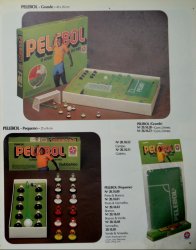
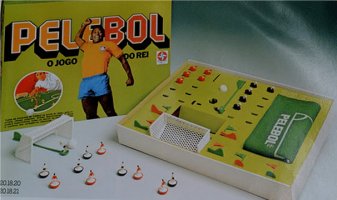
| Peter Upton's |
Subbuteo Tribute Website. |
|
Brazilian Production. |
|
Pelebol 1979. |


I think most Subbuteo collectors have this quirky edition as one of their favourites. Subbuteo and Pele. What's not to love?
Made under licence in 1979 by the big Brazilian toy company Estrela who were based in Sao Paulo. The small Subbuteo logo, and the circular picture on the box date this to the late 1970s. A big thank you to Subbuteo fan Pasquale Carrassi who lived in Brazil at the time, and has provided all the extra details for this rare edition. According to Pasquale, the set was only produced for a brief period around 1979. The team sets were unusual in that they included a ball, and instructions, which did, at least, allow a budget version of the game to be played, if the full edition was deemed too expensive.
March 2024: Some rather lovely catalogue pictures have come to light, showing the range as it was offered to Brazilian households of the time. Pleasingly, there are also examples of the sets, teams and accessories within the Subbuteo community, so the whole range is now illustrated.
Pelebol Grande (the complete box set).
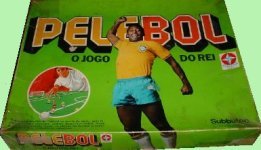
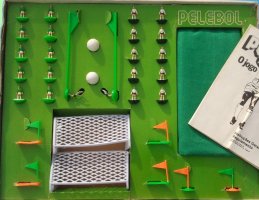
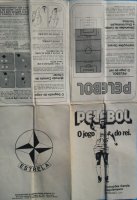
The club edition of Pelebol was actually produced in two versions:-
Pelebol had a range of six teams (including the four available in the sets), which were produced in the moulded feet version of the heavyweight player. These were produced and painted in Brazil. In Europe, we don't have moulded feet players beyond the early 1970s, which suggests that the moulds may have been exported. The teams were sold in card boxes similar to those of the early 1970s in Europe, but these also included an instruction booklet and a ball, and were called Pelebol Pequeno (see below).
If you look at the interior illustration above, you should see that the pitch has the Pelebol logo, the goals are a simplistic moulded plastic affair unlike normal Subbuteo ones, and three of the flags are in reverse colours - i.e. green flags on orange bases. Most strange. Odd coloured plastic continued into the teams. Pasquale mentions that the figures were produced on white, red and yellow plastic for outfield players and grey for the goalkeepers.
As an aside, Estrela did the same thing with Playmobil in the 1990s, producing the standard (white) European release spaceships (originally from the early 1980s) in brilliant colours - a little bit of samba going on?
Pelebol Pequeno (the simple team plus ball set)
.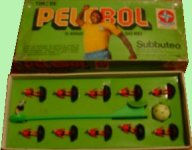
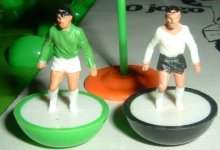
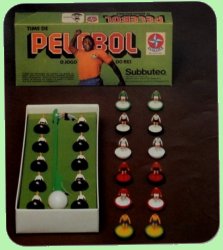
Pelebol had a range of six teams, and as with the boxed editions, these were produced in the moulded feet version of the heavyweight player. These were produced and painted in Brazil. As mentioned above, in Europe, we don't have moulded feet players beyond the early 1970s, which suggests that the moulds may have been exported. We also don't see this style of player in team sets (with the exception of Subbuteo Express).
The kits available were as follows:
So the Brazilians avoided getting the green and yellow Santos (reference 165 in the UK range). It is also worth noting that the players have white skin, rather than all being dark like Pele (which is what we usually got in the UK for Brazilian teams). The team boxes also included an instruction manual, and a ball. This made them more of a budget playing set.

As mentioned above, although most of the figures were produced on white plastic, red and yellow plastic for outfield players and grey for the goalkeepers were used where this sped up the painting of teams. It also helped with base colours, which is often a problem with moulded players.
Accessory Range.
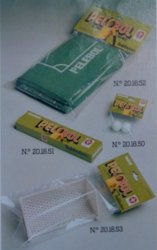

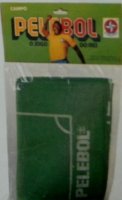
As the catalogue pictures show, Pelebol also had the following basic accessory range -
Not the most exciting range then, but at least it covered some of the essential, but fragile things from the box set. The one-piece goals were sturdy enough to be sold in a headed bag, but the spare goalkeepers earned the only accessory box in this range.
Despite being a football mad country, and despite the game having the Pele branding, Subbuteo/Pelebol in Brazil was not a success, and was only on sale for one year. Pasquale Carrassi has this reasoning for the failure -
"They were difficult years for the country, already struck by a strong inflation since the early seventies, which ended up causing the collapse of the local currency Cruzeiro and the ephemeral introduction of Cruzado in the middle of the eighties. Moreover in the course of 1979 the second international oil crisis broke out and had particularly devastating effects in Brazil, with repeated forced devaluations of Cruzeiro.
Only a privileged fews could afford the luxury of buying a Pelebol set, known as Pelebol Grande (the complete box) and Pelebol Pequeno (the simple team plus ball set)."
Luckily, Pasquale was one of the few who obtained the game(s) and the teams, and so the information lives on!
[ Main Page ]